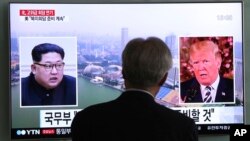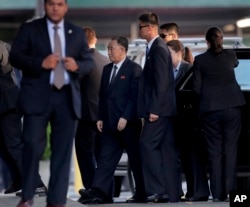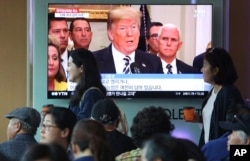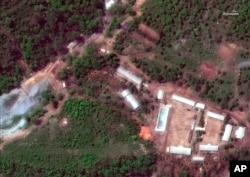Amid a flurry of rapidly evolving diplomatic activities aimed at reviving the summit between Washington and Pyongyang, experts contacted by VOA's Korean Service say that completely denuclearizing North Korea probably is unachievable.
"I think it is very difficult to know if these negotiations will lead to North Korea giving up its nuclear weapons," said David Albright, a former U.N. nuclear inspector and nuclear proliferation analyst at the Institute for Science and International Security. "The problem is that North Korea entered into negotiations twice now where that was the goal but never really intended to accomplish that goal."
Last week, President Donald Trump canceled the summit in a letter addressed to North Korean leader Kim Jong Un, citing Pyongyang's "tremendous anger" and "open hostility" toward Washington. Then North Korea's Vice Foreign Minister Kim Kye Gwan, a longtime nuclear negotiator and senior diplomat, said in a statement carried by state media that the North was willing to sit for talks with the U.S. "at any time in any format." Trump responded that talks regarding the summit scheduled to take place in Singapore on June 12 were "going very, very well."
On Wednesday night, Kim Yong Chol, vice chairman of North Korea's ruling Workers' Party, met with U.S. Secretary of State Mike Pompeo. On Thursday, they are expected to discuss final details of denuclearization talks for the summit, which is now expected to take place as anticipated in June.
Talks before the US summit
In Singapore, a U.S. summit preparatory team headed by White House Deputy Chief of Staff Joe Hagin has been coordinating summit logistics since Monday alongside Kim Chang Son, chief of staff to the North Korean leader.
And in the demilitarized zone (DMZ) along the border between South Korea and North Korea, a U.S. delegation headed by Sung Kim, the current ambassador to the Philippines and former ambassador to South Korea between 2011 and 2014, and a North Korean delegation led by Vice Foreign Minister Choe Son Hui are set to meet for the second time this week.
Against this diplomatic backdrop, VOA's Korean Service contacted 30 analysts, who unanimously said that Pyongyang will not yield to Washington's demand to abandon its nuclear weapons program completely. Here are some key comments from the experts.
Analysts
Douglas Paal, vice president for studies at the Carnegie Endowment for International Peace, thinks Pyongyang might agree in principle to give up its nuclear weapons and missiles at the summit talks with the U.S., but it could easily make excuses later and delay the process, especially if sanctions are relaxed. Trump's "maximum pressure" campaign has led international efforts to impose sanctions banning 90 percent of the North's trade.
Howard Stoffer, who served as deputy director of U.N. counterterrorism committee, also said the North could agree to completely denuclearize at the summit but the differences between Washington and Pyongyang over the pace of denuclearization could hamper the talks. Stoffer speculated the negotiations could stall if Pyongyang insists on its "phased" approach and demands that Washington make concessions as it takes steps to denuclearize.
"If they come in and say, 'No we are going to have to take something,' then I don't think there is going to be a negotiation," Stoffer said.
Pyongyang has said it prefers a "phased and synchronized" process of taking incremental steps toward denuclearization, expecting those steps to be matched by certain concessions from the U.S.
Washington, on the other hand, indicated it wants a one-shot denuclearization process that could be achieved rather quickly.
Michael Fuchs, former deputy assistant secretary of state for East Asian and Pacific Affairs during the Barack Obama administration, said there is a very low probability that North Korea will give up its entire nuclear arsenal in a short period of time, adding the Trump administration must have realistic expectations.
According to James Jeffrey, who served as deputy national security adviser in the George W. Bush administration, a realistic goal for the U.S. would be to obtain an agreement from the North that it will dismantle its nuclear weapons and facilities continuously over time by promising the North additional sanctions will not be imposed on the regime. He said North Korea will never agree to have its complete nuclear weapons packed up and shipped out of the country.
Experts think Kim will most likely agree to give up a part of North Korea's program instead of all of it, which is what the U.S. is expected to ask.
Ken Gause, director of International Affairs Group at the Center for Naval Analyses, said Kim, knowing that a complete, verifiable and irreversible denuclearization is impossible unless his regime collapses or is invaded, could try to hide a part of the program while declaring that the North has dismantled its program.
North Korea will try to maintain its nuclear program in some capacity, said Ralph Cossa, president of the Pacific Forum at the Center for Strategic and International Studies. He said that during negotiations, Pyongyang will agree to give up part of its weapons in exchange for economic support.
The process of give-and-take negotiation strategy that the North is expected to push for is all too familiar according to Gary Samore, White House coordinator for arms control and weapons of mass destruction in the Obama administration.
"We have all been through this experience before so it is very hard to take Kim Jong Un seriously," Samore said. "But the argument in [South] Korea is that he is different than his father and his grandfather, and he is very genuine about giving up its nuclear weapons in order for reform and to revive the economy. But as far as I can tell, that is not based on any evidence beyond Kim Jong Un's statements, which I don't think are very plausible."
Evans Revere, a former State Department official who negotiated with North Korea, said at best, Pyongyang will discuss denuclearization in ambiguous terms and agree to decrease the capacity of its inter-continental ballistic missiles and allow inspectors in to its Yongbyon nuclear facility. Revere said North Korea wants to weaken the U.S.-South Korea alliance and it is not truly interested in denuclearization.
White House Press Secretary Sarah Sanders said Tuesday the U.S. is preparing for the summit to proceed.
"We're moving forward, and we'll be prepared either way. And we're planning as if it is happening," she said.
Christy Lee contributed to this report, which originated on the VOA Korean Service.







